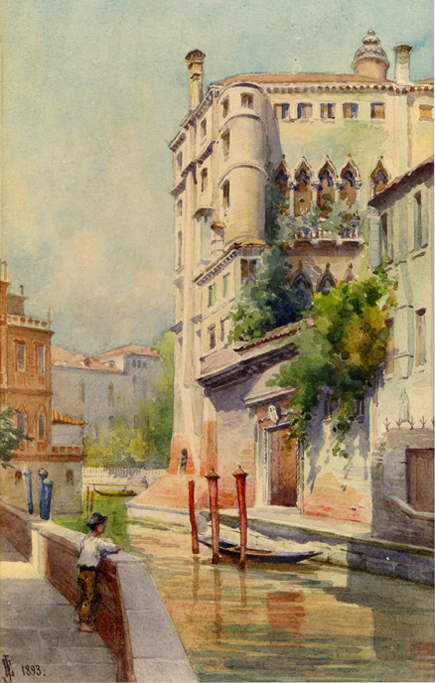|
PALAZZI
CONTARINI DEGLI SCRIGNI
AND
CONTARINI CORF┘

Palazzo Contarini degli Scrigni
and Palazzo Contarini Corf¨
The fašades towards the Grand Canal with Rio di San Trovaso
to the right
Photograph by Carlo Ponti c.1880, from the Arfwedson/Greaves
archives
The handwritten notes may be contemporary. They indicate
that the entrance to the left (degli Scrigni) is Mereweather's and
that the entrance to the right (Corf¨) is that of the
Greaves family. For thoughts on Mereweather's
apartment see below.
Palazzo Contarini Corf¨ was built in the 15h century.
Palazzo Contarini degli Scrigni, although of a completely
different style, was built in 1609 as an enlargement of
the original palace. The whole complex is often referred to
as Palazzo Contarini degli Scrigni-Corf¨ or simply Palazzo
Contarini degli Scrigni.
Rio di San Trovaso is sometimes referred to as Rio delle
Maravegie.

Palazzo Contarini
in San Trovaso on the Grand Canal
Architecture of Vincenzo Scamozzi
Etching by
Luca Carlevarijs, published in
Le fabriche e vedute di
Venetia, 1703

Palazzo Contarini degli Scrigni and
Palazzo Contarini Corf¨
Photograph kindly provided by Gunilla Bj÷rkvall, July 1994

View of the Grand Canal towards Rialto
The Contarini palaces can be seen to the left
Photograph by Gunilla Bj÷rkvall taken from the Accademia bridge in
July 1994

View of the Grand Canal with the
Accademia bridge
The Contarini palaces can be seen behind the bridge to the left
Photograph by Paolo Salviati, c. 1880
 |
 |
The Grand Canal
Watercolour by an unknown artist, probably late 19th
century, depicting Palazzi Contarini degli Scrigni and Corf¨
along with Palazzo Loredan degli Ambasciatori (which
conceals Rio di San Trovaso)
|
|
|
 |
 |
Rio di San Trovaso
View towards the Grand
Canal with Palazzo Contarini Corf¨ to the right
Watercolour 1893 by Ellen Jolin,
Swedish painter and writer, 1854-1939
For more information on Ellen Jolin,
click
here.
|
|
|
 |
 |
Rio di San Trovaso
The same view as the image above but in May 2004
Photograph kindly provided by Stefano Soffiato, of
www.venessia.com
The main parts of the two pictures are shown below side by
side for better comparison.
|
|
|

Rio di San Trovaso with Palazzo Contarini Corf¨
to the right
Frederick Rolfe (Baron Corvo) describes Canon Lonsdale Ragg's apartment
in 1909. The entrance (probably Dorsoduro 1057) lay in Calle
Contarini Corf¨, an alley
perpendicular to Rio di San Trovaso. Moreover, "the Wardens' [i.e. the Raggs'] castle in Palazzo Corf¨ began on the fifth
storey with four enormous halls and a chapel containing a
lavatory, egregiously plank- and shaving-littered, obstructed
by made and unmade packing-cases. Monstrous old couches,
bureaux, pianos, book-shelves, crated and uncrated, sprawled
and straddled across marble floors. The first hall was
mucked with rejected crockery, kitchen stuff, and furniture. A winding stair in a turret led, past a
kitchen (similarly disordered), to a top storey of nine garrets (one large,
four tiny, all low) lying along extended corridors. ...
Crabbe wandered about, wondering why in the world the
Wardens never occupied this apartment instead of borrowing
other people's or living in hotels, as Erastian Venice
tittle-tattle said was his constant habit. It was light,
airy, well-sunned: from its windows were simply lovely
views, of Canalazzo to beyond the Salute on the
one hand, and (on the other) over the marvellous tiled roofs
and chalice-like chimneys and verdant terraces and gardens
and solemn byzantine bell-towers of the greater part of the
city, across the blue lagoon to the snow-clad battlements of
the Alps seventy miles away. It was an eyrie aloft, where
one might have made oneself most smug and secret and have done no
end of decent work. But the rooms hadn't been prepared for
habitation for years and years." (Desire, p. 212)
Ragg's apartment, then, would have been situated in the Corf¨ part of
the complex, and may have had a direct connexion with, or even
extended into, the degli Scrigni part. Mereweather may have
occupied the same apartment and held services there; if so, it
could well have been more practical for the congregation to use
the degli Scrigni entrance on the Grand Canal rather than enter
from the back alley. Besides, since the apartment had not been
lived in for many years, one may suspect that the "monstrous old
couches" and other pieces of furniture were in fact the
remainder of Mereweather's belongings which his heirs had found
too expensive to convey out of Venice.
According to
Jan-Christoph R÷ssler, I palazzi
veneziani, Venice 2010, p. 289, the palace complex remained
in the hands of the Contarini family until the mid 19th
century. In 1856 it was sold to the Countess Matilde Strachan
Berchtold (1813-1899). She would have been the daughter of Sir
Richard Strachan, 6th Baronet of Thornton, and have married
Count Anton Maria Berchtold in Prague in 1833. The next owner
of the Contarini palaces in San Trovaso was, from 1886, George
Peabody Russell (1835-1909); he was the nephew of the American
entrepreneur and philanthropist George Peabody (1795-1869).
Now the palaces are the property of the Rocca family. There is
a website with many fine pictures:
http://www.palazzorocca.it
.
Information regarding George Peabody Russell,
especially his time in Venice, would be highly appreciated.

|


